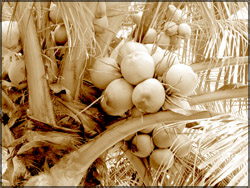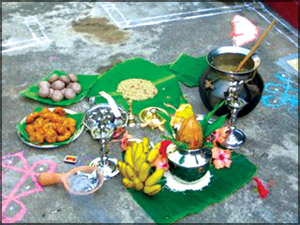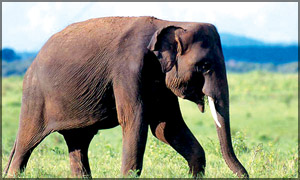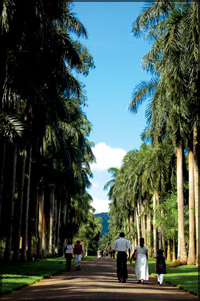|

Coconuts in Nuwara Eliya
 Would
you believe that coconuts could grow in Nuwara Eliya? If the island-wide
coconut planting campaign launched recently by the Plantations Ministry
is successful, it wouldn't be so novel to see coconut plantations in the
Nuwara Eliya district. Would
you believe that coconuts could grow in Nuwara Eliya? If the island-wide
coconut planting campaign launched recently by the Plantations Ministry
is successful, it wouldn't be so novel to see coconut plantations in the
Nuwara Eliya district.
What was planted in the Haggala and Victoria Gardens of Nuwara Eliya
at the launch of this campaign was a hybrid coconut variety developed by
the Coconut Research Institute (CRI), to suit the cold climatic
conditions of this area.
The necessary coconut genes required for this experiment were
provided by China. Chinese assistance was sought after CRI officials
were able to witness for themselves how coconut cultivation was
maintained in China's Haina island where the temperature is below five
degrees Celsius.
The project was part of the drive launched by the Ministry in
collaboration with the Coconut Development Board to cultivate one
billion coconut saplings islandwide.
Coconut planting campaigns have also been initiated in the Ampara,
Trincomalee and Batticaloa districts in the East. A new coconut variety
is also expected to be introduced to suit the climatic conditions of the
Vavuniya and Mannar districts in the North.
University for dhamma
school teachers
Most of you would be attending dhamma schools. The government, with a
view to improving the quality of the teachers who teach at these
schools, will shortly set up a university to provide higher education to
them.
This proposed new university would provide opportunities for dhamma
school teachers to study languages and Buddhist philosophy in depth and
gain further training in teaching methods.
Teachers of these schools have been recognised as providing an
invaluable service to society by imparting knowledge of the dhamma to
the children and promoting discipline and also moral and spiritual
values among them. Thus, it has been acknowledged that they should be
given all assistance and encouragement to further their knowledge and
skills.
Harvest festival of Thai Pongal
 Thai
Pongal, which falls on January 15, is one of the most significant and
colourful ceremonies celebrated by Tamil Hindus of Sri Lanka and India.
The harvest festival is a feast of thanksgiving where the Hindus offer
their thanks to the Sun God who had been instrumental in giving them a
bountiful harvest. Thai
Pongal, which falls on January 15, is one of the most significant and
colourful ceremonies celebrated by Tamil Hindus of Sri Lanka and India.
The harvest festival is a feast of thanksgiving where the Hindus offer
their thanks to the Sun God who had been instrumental in giving them a
bountiful harvest.
After the wet months of October, November and December, it signifies
the arrival of the Sun and bounteous crops. This is the time when people
clean and renovate their houses and old pots and pans are replaced with
new ones.
There are many rituals associated with the festival, starting with
the boiling of a pot of rice at sunrise on the front doorstep of the
house, to shouts of "pongal" from family members.
The next day is Paddipongal. This event honours the cattle, which
play a vital role in agricultural societies. Cows and bulls get a rest
on this day.
Programme to protect wild
elephants
 A
special project titled 'Gaja Mithuro' has been planned by the Wildlife
Department with the objective of protecting wild elephants that are
under the threat of extinction and to uplift the living conditions of
families displaced due to the human-elephant conflict. A
special project titled 'Gaja Mithuro' has been planned by the Wildlife
Department with the objective of protecting wild elephants that are
under the threat of extinction and to uplift the living conditions of
families displaced due to the human-elephant conflict.
The project would be implemented with assistance from the Environment
and Natural Resources Ministry. A sum of Rs. 118 million has been
allocated for this project, to put up electric fences.
When installing these electric fences, priority will be given to
areas which face the biggest threat, from where the highest number of
killings and the most severe damage have been reported. The work is
expected to see completion within three years.
According to a recent Wildlife Department survey, over 50 humans and
over 150 elephants lose their lives annually due to the human - elephant
conflict.
Campaign to
raise awareness about heritage
Cabinet approval has been granted to a memorandum on a national
campaign to create awareness about the island's heritage among
schoolchildren.
Sri Lanka's heritage needs to be conserved, protected and handed over
to the younger generation by the elders. One of the best and most
effective ways to achieve this objective is by creating better awareness
and appreciation of the local heritage among the public.
The campaign titled 'Nation's Heritage is for Children' is to be
implemented over a period of 10 years and Rs. 5 million is expected to
be set apart for this purpose every year from 2008.
Botanical garden
in the dry zone
|

Peradeniya Botanical Garden. |
Sri Lanka has many botanical gardens as you all know; you may have
even visited a few of them. One thing you may have noticed when it comes
to the botanical gardens of our country is that they are all located in
the wet zone.
The dry zone has been lacking in such environmental features so far.
This would be a thing of the past however with the first ever Dry Zone
Botanical Garden in the island being set up at Mirijjawila, Hambantota.
The botanical garden is estimated to cost Rs. 100 million. Three
hundred hectares of Mahaweli land have been allocated for this project.
The main objective of the project is to attract more tourists to the
area.
Tasmanian devils face cancer scare
A mysterious cancer has wiped out more than half the population of
Tasmanian devils and threatens the species with extinction, scientists
said.
Fierce and carnivorous, Tasmanian devils earned their name from early
British settlers for their steel-trap jaws and blood-curdling nocturnal
(nightly) screeches. The size of a small dog, they live only in Tasmania
and were immortalised (made to be remembered long after death) by Warner
Bros with the snarling Loony Tunes cartoon character.
But for all their famed ferocity(fierceness), they have proved to be
vulnerable to a highly infectious cancer which emerged about a decade
ago. Up to 50,000 are believed to have died from the disease, which
causes hideous facial tumours.
Most die of starvation within six months, their mouths so swollen
that they can no longer eat. Scientists estimate that 60 are now
infected and fear that, within five years, the cancer could send the
species the way of the Tasmanian tiger, which died out in the 1930s.
The Daily Telegraph
|
